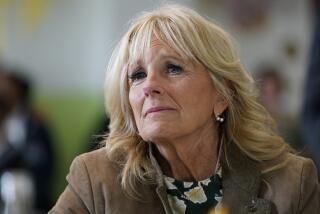Hillary Clinton Schooled in Doctrine of Methodism : Theology: The next First Lady is familiar with religious thinkers. She credits the church with shaping her sense of social responsibility.
Considering her church involvement and familiarity with religious thinkers, Hillary Clinton may turn out to be a kind of theologian-in-residence among the new occupants of the White House.
She’s done some occasional lay preaching, a time-honored role in her Methodist tradition, and has perused works of some of the century’s theological giants.
These characteristics emerged in conversations with church and educational associates in her native Illinois.
She told Jean Caffey Lyles, director of United Methodist News Service, that she has always been enchanted by the “wonderful old saying” of the church’s founder, John Wesley, about doing “all the good you can.”
The rule goes: “Do all the good you can, by all the means you can, in all the ways you can, at all the times you can, to all the people you can, as long as you ever can.”
Clinton says she finds Methodism’s “emphasis on personal salvation combined with active applied Christianity” to be a “practical method of trying to live as a Christian in a difficult and challenging world.”
Although she probably won’t do much denominational flag-waving as the nation’s next First Lady, she previously has given occasional talks in churches on “Why I Am a United Methodist.”
She says she’s drawn to “the approach of a faith that is based on ‘Scripture, tradition, experience and reason,” the cherished guideposts of Methodism.
Hillary Clinton will be the first Methodist presidential wife since the turn of the century, when President William B. McKinley’s wife, Ida, occupied the White House.
Discussing her religious views with Lyles at a stopover in Chicago late in the presidential campaign, Clinton said: “As a Christian, part of my obligation is to take action to alleviate suffering. Explicit recognition of that in the Methodist tradition is one reason I’m comfortable in this church.”
She said when she and her husband, President-elect Bill Clinton, decided to marry after meeting at Yale Law School, both had “strong feelings about our respective traditions.” He’s a Southern Baptist.
“We spent a lot of time talking about our religious faith and beliefs,” she recalled.
They’ve stayed with their own denominations. In Little Rock, Ark., she’s a member of First United Methodist Church, and he belongs to Immanuel Baptist Church.
“We, of course, think the most important thing is your personal relationship with God, and the denomination you belong to is a means of expressing that and being part of a fellowship,” she said.
They’ve visited “a lot” in each other’s churches, she said, and have exposed their daughter, Chelsea, 12, to both traditions. Chelsea was confirmed a Methodist in her mother’s church last spring.
Clinton said that in “the daily back-and-forth of living,” especially in rough times, “prayer is a very important replenisher.”
“When Bill is home, he prays with Chelsea every night,” she said. “We say grace at meals. When we cannot get to church, we often have a devotional.”
On the campaign trail, she said she carried a “tiny little Bible that has Proverbs, Psalms and the New Testament.” She said she finds the Bible a “never-ending well that I can go to” for sustenance.
Before the campaign schedule curtailed some church activities, she did occasional lay preaching and taught adult Bible classes for various periods.
She said in her family line, Methodism goes “way back to the days” of Methodist camp meetings. But she stressed that “my faith wasn’t just my parents’ passing on to me what they wanted me to believe.”
Active as a youth in First Methodist Church in Park Ridge, Ill., a Chicago suburb where she grew up, she credited the youth minister, the Rev. Donald Jones, with helping shape her sense of social responsibility.
Jones is now professor of social ethics at United Methodist-related Drew University in Madison, N.J. He recalls that as a 16-year-old, Clinton was reading theologians such as Dietrich Bonhoeffer.
Jones said he once took the youth group into downtown Chicago to hear the late Martin Luther King Jr. speak and introduced each youth to King afterward. Jones also set up conversations between suburban youths and black and Latino gang members and arranged for church youths to baby-sit children of migrant workers.
Clinton said, “Having my eyes opened as a teen-ager to other people and the way they live certainly affected me.”


